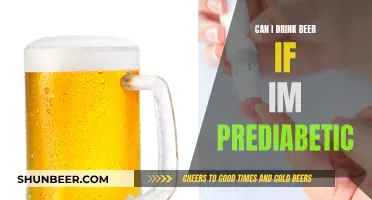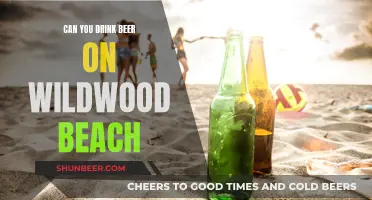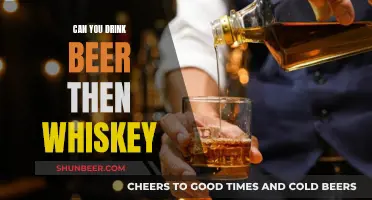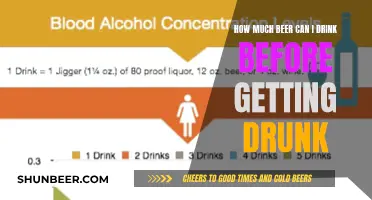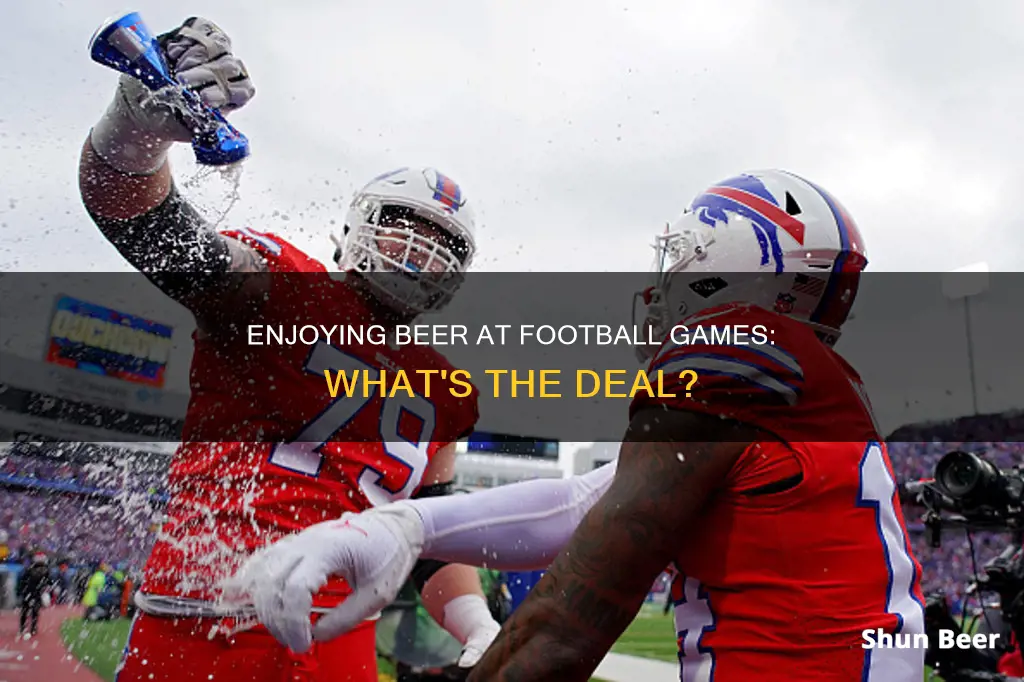
Whether or not you can drink beer at football games depends on where you are in the world. In the US, alcohol is sold at many college football games, with 88% of FBS schools selling alcohol during the 2023 season. In Europe, the sale of alcohol at football stadiums varies by country. In the UK, alcohol cannot be consumed in parts of English football grounds with a view of the pitch, and it is banned in all areas of Scottish football grounds except corporate hospitality. In France, it is illegal to use alcohol sponsorship in sports. In Germany, alcohol is typically not sold inside football stadiums, but fans can drink in the concourses underneath.
What You'll Learn

Beer at college football games
Beer and alcohol sales at college football games have become more common in recent years. While it was previously rare to find alcohol being sold at a college football stadium, with only around 40 out of 130 FBS Division I college football programs offering in-stadium alcohol sales in 2018, that number has increased significantly. By 2019, the number had nearly doubled to 78, and as of 2023, 88% of schools will sell alcohol during college football games. This change can be attributed to the NCAA and conferences loosening rules and allowing universities to sell alcohol.
There are still some colleges and universities that do not allow the sale of beer or other alcoholic drinks during college football games. For example, the University of Georgia does not allow public alcohol sales during football games, although they do offer alcohol in club areas that require donations to the athletic program. The University of Michigan is also on the list of schools that do not sell alcohol during football games, although they do sell alcohol at basketball and hockey games.
The decision to sell alcohol during college football games is often driven by the potential for increased revenue and the desire to attract more fans to the stadium. However, there are still concerns about promoting alcohol abuse and the potential for security or legal issues that may arise from alcohol consumption at the games.
The availability of alcohol may also depend on the seating location within the stadium. Some colleges restrict alcohol sales to premium seating areas or suites, while others offer it throughout the stadium.
Overall, the trend towards allowing beer and alcohol sales at college football games is likely to continue, reflecting the changing attitudes and demands of fans and the potential financial benefits for universities.
Beer and Gum Grafts: What You Need to Know
You may want to see also

Alcohol and hooliganism
Alcohol and football hooliganism have been linked for decades, with the belief that alcohol consumption leads to hooliganism. However, this notion has been challenged, with some arguing that alcohol is not a primary factor in football-related violence. While alcohol can act as a disinhibitor, increasing the likelihood of violent behaviour in certain individuals, it is not a causal factor in all cases. Additionally, instances of serious organised violence often occur with little to no alcohol consumption, as being drunk inhibits fighting abilities.
The effectiveness of alcohol bans in reducing hooliganism is debated. Banning alcohol sales in stadiums and restricting access to alcohol in the vicinity of football matches have been implemented as measures to curb hooliganism. While these restrictions may reduce alcohol consumption for some fans, they do not always have the desired effect on hooliganism. In some cases, fans may find alternative sources of alcohol or engage in binge drinking before the match, leading to higher levels of intoxication. Early kick-off times to reduce the time available for drinking have also been suggested but are controversial, as fans may continue drinking after the match, leading to late-night violence.
Instead, positive interaction between fans and police, along with effective segregation of rival fan groups, are considered more effective strategies for reducing the risk of disorder. "Fan coaching" or "diversion" techniques, which involve educating supporters on respectful behaviour and accepting defeat without violence, have been implemented in some countries with some success. Overall, while alcohol may play a role in fuelling football hooliganism, it is not the sole cause, and a multifaceted approach is needed to address this complex issue.
Digital Beer Rebates: How Do They Work?
You may want to see also

Drinking cultures in football
In the UK, traditional football foods such as meat pies and Bovril are often accompanied by drinking, and this has been a part of fan culture since the 1970s. However, due to unwanted behaviour caused by drinking, the sale of alcohol to general supporters in stadiums across the UK has been banned, with only English and Welsh clubs continuing to sell alcohol within general stadium areas.
In Germany, it is common for football fans to eat bratwurst and drink beer, and in Argentina, drinking and eating choripán (a sandwich with grilled chorizo and crusty bread) and grilled hamburgers are commonly served in stadiums.
The famous Arsenal 'Tuesday Drinking Club', established in the 1980s, is an example of the 'old school' drinking culture in English football. Arsene Wenger, who became Arsenal's manager in 1996, worked to improve the eating, drinking, and lifestyle choices of his players, and within 18 months, Arsenal won the Premier League and FA Cup.
While drinking cultures in football have decreased in recent years, there are still instances of alcohol-related misbehaviour. Tottenham Hotspur defender Ledley King's drunken delinquency in a nightclub led to manager Harry Redknapp banning alcohol from the club for the next season.
Overall, the globalisation of football and the influx of money from TV deals have contributed to a shift in drinking cultures, with players now held to higher standards of physical fitness and discipline.
Beer, Anxiety, and You: A Curious Concoction
You may want to see also

Alcohol advertising in football
Alcohol and sports have long been intertwined, with alcohol advertising in sports coming under scrutiny in recent years. In football, alcohol sponsorship has been a common feature, with teams and competitions benefiting from revenue generated through such partnerships. However, there is a growing recognition of the potential negative impacts of alcohol advertising, particularly on young audiences, which has led to increased regulations and a shift in sponsorship trends.
In the past, it was common for alcohol companies to sponsor football teams and events, with shirt sponsorships being a prominent form of advertising. However, this has changed in recent years, with the 2017/18 Premier League season being the first without any alcohol company shirt sponsors. While beer partnerships remain prevalent, with the FA maintaining ties with alcoholic beverage companies, the landscape is evolving.
A report examining alcohol sponsorship in the top tier of professional football across 10 European nations found that while only 2.6% of main sponsors were alcohol-related, 72.5% of the 178 teams audited had at least one alcohol-related sponsor. This highlights the continued presence of alcohol companies in football, even as primary sponsorships become less common.
The impact of alcohol advertising in football is far-reaching, especially when it comes to televised matches. A study analysing alcohol advertising during English Premier League (EPL) games broadcast in Ethiopia found that alcohol advertising accounted for 8.4% of the total broadcast time, with the majority of advertisements occurring during active football playing time. This high frequency of exposure can have significant implications, especially for young viewers, as it may contribute to increased alcohol consumption and associated health risks.
Regulations and restrictions on alcohol advertising in football vary across countries. For example, France and Norway have implemented statutory regulations on alcohol marketing, including sports sponsorship, resulting in a decrease in alcohol sponsorship compared to countries without such controls. On the other hand, countries like Scotland and Belgium have a higher proportion of alcohol industry sponsors due to the lack of statutory restrictions.
In summary, alcohol advertising in football has been a prevalent form of sponsorship, but it is facing increasing scrutiny and regulation. While alcohol companies continue to sponsor football teams and events, the landscape is shifting, with a focus on reducing exposure, especially for younger audiences. As the dialogue around alcohol's role in sports evolves, we can expect further changes and adaptations in the way alcohol is advertised and consumed within the football industry.
Beer Hawk: Craft Beer Discovery and Delivery
You may want to see also

Alcohol bans in football
In Scotland, alcohol is banned from all parts of football grounds since unrest at the 1980 Scottish Cup final, excluding corporate hospitality areas. This ban was considered for revocation during UEFA Euro 2020 but was opposed by the police.
In France, it is illegal to use sponsorship to promote alcohol due to the Loi Évin passed in 1991. This means that visiting foreign teams must remove alcohol branding from their kits when playing in France. A similar ban on alcohol advertising on children's replica kits has been implemented in the UK, with alcohol companies voluntarily removing their branding.
College football in the United States has also seen a shift in alcohol policies, with more schools allowing the sale of alcohol to fans in recent years. However, there are still some states and schools that maintain restrictions or bans on alcohol sales during college football games.
Antibiotics and Alcohol: Is It Safe to Drink Beer?
You may want to see also
Frequently asked questions
Yes, in the US, alcohol is sold at college football games. Of the 133 FBS schools in 2023, 117 (88%) will sell alcohol this upcoming season.
In Europe, the laws around drinking beer at football games vary from country to country. In the UK, alcohol is forbidden in your seats but allowed in the back of the stands. In France, it is illegal to use alcohol sponsorship in sports. In Spain, alcohol with an ABV of 20% or higher is banned from sports sponsorship.
Alcohol is banned at some football games to curb hooliganism and prevent fights.


